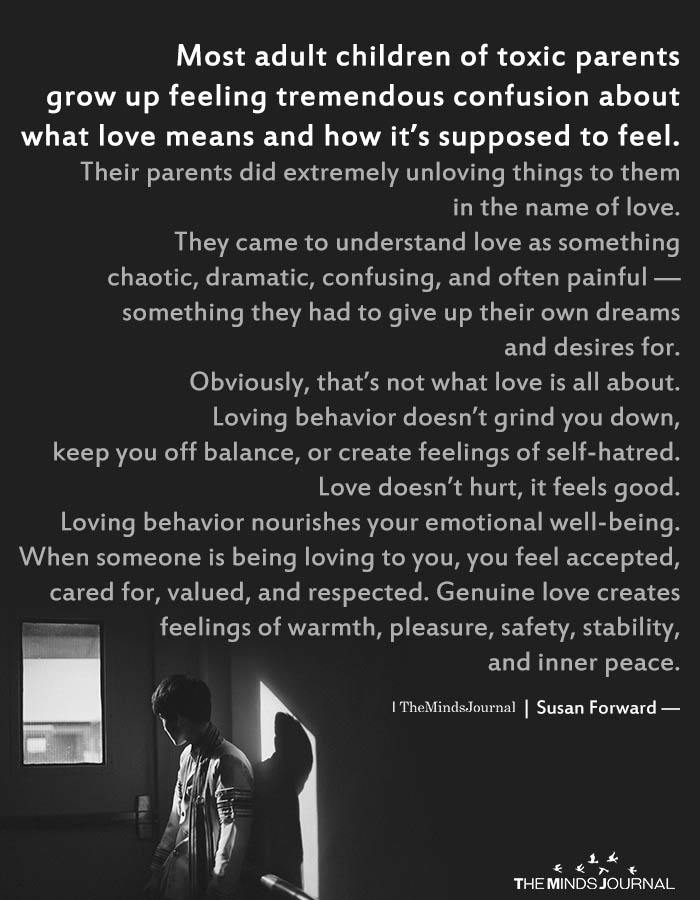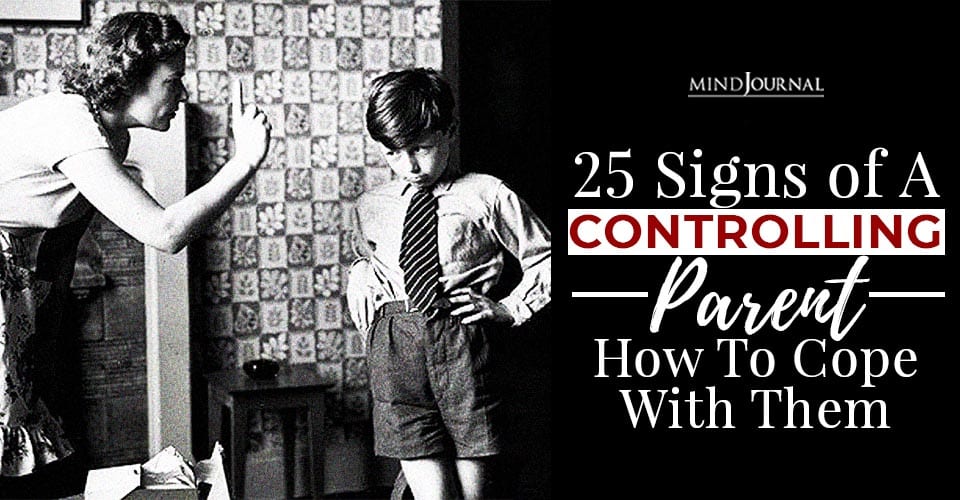Every parent wants to raise their child the best they can. However, some parents believe they know what’s best for their kids and become a controlling parent. If you think your parents are overbearing, then here’s what you need to do.
Controlling parents: Who are they?
Most children have loving and supportive parents who respect their decisions and encourage them to pursue goals. However, some of us believe we are never good enough or worthy of being trusted and respected by our parents. Toxic parents criticize, berate and demean their children constantly. But worst of all, they control every aspect of their child’s life claiming they know what’s best for their children. A toxic parent may be overbearing and controlling even when their child is in their adulthood.
Controlling parents possess the characteristics of Authoritarian parenting style. Several studies have found that parenting styles can significantly affect children and can impact their development, behavior, personality, academic achievement and mental health.
Parents who are authoritative and controlling are excessively strict and establish rules that must be followed by their kids at all costs. These parents are usually nonresponsive to the needs of their children and mostly use parent to child communication. Controlling parents may also use various manipulative strategies like emotional blackmail, guilt trips and shame, to control their kids. All of these can severely influence the emotional and mental health of the child.
Read: 4 Types Of Parenting Styles In Psychology: What Kind Of A Parent Are You?
Controlling parents “don’t leave space for their children to have their own emotional experience and develop a sense of autonomy,” says family therapist Esther Boykin, MFT. Although they may support your education and help you build your career, as long as they approve of it, they do so mostly out of guilt for being so controlling. Boykin adds “Our parents know all of those soft spots. If they want to exert control, they’re really good at doing it in ways that can be fairly indirect.”

Why are parents controlling
Growing up with controlling parents can be nerve-racking, even as an adult. But before you brand them as monsters and start a big fight, it is important to understand why they behave the way they do. It is crucial that you analyze their behavior and learn about their motivations. “A difficult childhood is often the reason for a person’s erratic ways. Controlling parents may have manipulative parents or siblings themselves; they grew up believing that controlling others is a given behavior,” says educator Michelle Liew.
Manipulative parents are often victims of abuse and have been hurt extremely in the past. Their insecurities drive them to be excessively strict with their children and become overbearing. They see their kids as their only opportunity to be dominant and gain control as they have been rather submissive in the past. Moreover, some parents can just be narcissistic and manipulate their children to boost their ego. They have high expectations from their kids and refuse to understand the perspectives of their children.
Read: Over-Controlling Parents: The Burden Of Being Over Controlled As A Child
Licensed clinical psychologist Sarah Schewitz, Psy.D. says, “There are many reasons a mom might be controlling. One reason is anxiety.” She adds “Another reason a mom might be controlling is that it is a learned pattern of behavior. She may have grown up with controlling parents which taught her that controlling is how you parent effectively.”
Having power issues may also be a reason that can drive a parent to be more controlling. Sarah explains “She may have grown up in a home where she felt out of control or powerless. Her feelings may not have been respected or she may not have had a voice in [her] home. If she hasn’t done the work to get over this, she will continue fighting this power struggle throughout her whole life.”
Once you know what makes a parent manipulative and authoritative, you can start recognizing the signs of controlling parents.
Signs your parent is controlling
Most parents are controlling to some extent. This is how they raise their children to be their best, instill values and contribute to society when they grow up. However, there is a difference between being strict and controlling.
Read: 6 Signs Of Controlling Parenting And The Effects It Has On The Child
Here are 8 signs that will help you identify if your parents are too controlling.

1. They criticize you excessively
Most parents criticize their kids at times. This allows us to learn and improve ourselves. However controlling parents can be extremely critical and react negatively to everything their kids do. Author and entrepreneur Holly Chavez explains “Parents can make the mistake of believing that they do this to make sure their children avoid making costly mistakes.” Sadly, it only leads to low self esteem, distorted sense of self worth, shattered self confidence and a cruel inner critic.
2. They have unrealistic expectations
Controlling parents tend to be perfectionists and want their children to achieve unattainable standards and have irrational expectations. This is highly unhealthy for the parent-child relationship. But worst of all, if the child fails to accomplish the unrealistic goals, they are severely punished. Most toxic parents ask their children to get something done, without teaching or showing them how to actually do it. And when the children are unable to complete the task, the parents react harshly. Darius Cikanavicius, author and certified mental health coach, says “Oftentimes the child is set up for failure and they will experience negative consequences regardless of what they do and how they do it.”
3. They know what’s best for you
They tell what you should eat, what you should wear, what career is best for you, who you should date and what not. They always have an opinion regarding everything you do and claim that they are only looking out for your own interests. The fact is, controlling parents will never approve of your decisions unless it matches with theirs. As a result of this, children with manipulative parents become dependent, always seek external validation and approval and lack decision making skills. “They refuse to consider alternative courses of action and do not give you the freedom to make decisions,” writes Michelle Liew, B.A.
Read The Lifelong Effects of Childhood Neglect By Parents
4. They set unreasonable rules
Controlling parents don’t feel the need to negotiate or explain the rules and regulations they set for their children. Most of these rules are impractical and unilateral and usually don’t have any logical explanations. “Controlling parents set strict rules that apply only to the child, or only to certain people. Instead of appealing to the child’s self-interest, it’s an appeal to the power disparity between the parent and the child,” says Darius.
5. They publicly humiliate you
Toxic parents don’t think of their children as independent individuals. Instead, they consider their kids as an extension of themselves, says author and art director Catherine Winter. And perhaps this is why they fail to realize that you deserve respect and courtesy like everyone else. They often disrespect and berate their children in public to gain sympathy from others and strengthen their own distorted views. They may even do this to boost their ego and amuse themselves.
Catherine explains “It’s one thing if your parent tells you that they don’t like the décor in your home, your choice of career, your hair color, or your wardrobe. But it’s another thing entirely if they mock or belittle you in front of other people.”
6. They lack empathy and kindness
Although controlling parents offer basic necessities like food, shelter & clothing to their kids, they greatly lack love, care, affection and kindness. Most toxic parents fail to show empathy to their children probably due to their own insecurities or they fear they might not be able to dominate you.
Darius Cikanavicius explains “Most parents are usually able to meet the child’s physical, basic needs, yet they are either emotionally unavailable, severely lacking, overbearing, or selfish. This feedback that the child receives in a form of punishments and controlling treatment is damaging to their sense of self-worth and identity.”
7. They blame you for their problems
Toxic parents often blame, shame and pressurize their children for their own misfortune. This is a manipulation technique used to make you comply. They also hold you responsible for their happiness by using strategies like emotional blackmail, showing superiority and psychological control. They keep telling you about how much they have sacrificed for you and compel you to do what they want, even if it’s something you don’t want to do.
Entrepreneur Holly Chavez writes “If one of your parents spent a lot of time telling you how much they gave up for you in connection with their unhappiness, then they were placing unrealistic expectations on your role in their life. No child should be held accountable for their parent’s happiness.” She adds “Parents should never demand that children give up things that make them happy in order to even out the score.”
Read: Sons Of Narcissistic Mothers and The Damage They Suffer
8. They don’t respect you privacy
Toxic and pushy parents often fail to understand the importance of healthy personal boundaries. A controlling parent will refuse to give you any space and will constantly invade your personal space. They will never give you any privacy and may even stalk you on social media. Although parents should supervise their child’s online activities, there is a fine line between guiding your children to keep them safe and stalking.
Holly adds “Everyone needs to be able to set boundaries for themselves, especially teenagers. Parents who are toxic override these boundaries at every turn and this causes numerous problems.”

Apart from these, there are many other signs of controlling parents, some of which are listed below:
9. They tend to be passive-aggressive
10. They try to control or approve your relationships
11. They do not allow you to question or disagree with them
12. They make you doubt yourself
13. They are ignorant or unaware of the pain they cause you
14. They constantly demand attention from you
15. They make decisions for you without asking for any suggestions
16. They communicate with others on your behalf
17. They don’t allow you to express negative emotions like anger, fear & sadness
18. They are more concerned about their own feelings, instead of yours
19. They try to monopolize your love, affection and time
20. They always fight your battles for you
21. They are too involved in your personal and professional life
22. The refuse to provide you affirmation, validation, safety and security
23. They control you by using money and guilt against you
24. They discourage you from taking decisions on your own
25. They never admit their mistakes
How to deal with a controlling parent
If you can identify with some or all of the signs of a manipulative parent mentioned above, then don’t feel discouraged. There are several coping mechanisms that can help you to deal with the toxic behavior of your parents.
Here are a few ways that can help you get started.
1. Empower yourself
Start by setting personal boundaries even though your parents might be used to violating your privacy. When you set boundaries, you take a step making the parent-child relationship more tolerable and agreeable. Educator Michelle Liew, B.A. says “You may have parents who try to keep you in an Alcatraz-like, emotional prison, but you are responsible for your actions. Develop a plan to set boundaries and gain control of your life.” Make your own decisions and learn to stand up for yourself.

2. Stop pleasing them
You don’t need to seek affirmation, affection, approval or validation from your parents. Despite how hard you try to make them proud of you or to gain their love, they will never express it the way you want them to. Michelle suggests “Do not obsess over pleasing them; remember that you have your life to live.”
As we do not want to anger or disappoint our parents, confronting them becomes even more difficult, says Laurie Pawlik-Kienlen, author of Growing Forward When You Can’t Go Back. She explains “We want them to keep loving us – even when we feel like we hate them! The first tip on how to deal with controlling parents (or any toxic person in your life) is to recognize your need to please them. Accepting that you really want your parents’ approval and love will help you communicate with them better.”
“It is okay to seek love and approval from parents for things you do, but expecting the same every time may not be a good idea,” suggests Shikha Thakur, certified emergency care expert from the University of Colorado.
Read: The Childhood Wounds We Carry In Adulthood, When We Were Deprived of Love
3. Detach from your emotions
As human beings, we are often flooded with emotions when experiencing different situations. So when you grow up with controlling parents, it is likely that your emotions will dominate you. However, letting your emotions guide you can be more damaging than you think. Negative feelings like sadness, anger, resentment and fear can prevent you from acting in the best possible way by clouding your judgement, says art director Catherine Winter. She adds “When you learn to cool your emotions and disconnect them from your thoughts and actions, you can respond to your parents’ behavior in ways that will improve the situation for you, rather than make it worse.”
“When you are not happy with the controlling nature of your parents, you should talk to them instead of being silent and building resentment,” explains Shikha. You also need to ensure that you don’t react in anger and say something hurtful. Keep in mind that they are your parents. They are not your enemies despite how evil they might seem to you.

4. Accept them as they are
You can expect them to change as much as you want, but it is highly likely that they will remain controlling all their lives. The more want them to change or to have a different family, the more you will feel frustrated with your situation. This will only lead to increased stress, anxiety and depression within you. So it’s better to accept them as they are. “You cannot change your parents; that is a fact you must accept. However, you can choose to distance yourself from them. Stand your ground, and do not get too defensive if they accuse you of neglecting them,” explains Michelle Liew.
Let go of your want to have better parents. Let go of your desire to be loved and appreciated by them. Accept the reality of your family and give yourself the love you seek from your parents. “This is your life, and the sooner you accept it, the happier you will be,” says Laurie Pawlik-Kienlen. She adds “You can still hope you’ll one day have a better, healthier relationship with your parents. But, you must stop hoping and wishing they’d change… You have control over your thoughts and feelings! You are free to choose to distance yourself emotionally, physically, socially, and financially.”
5. Seek help
If you feel like things are getting out of hand and it’s becoming unbearable for you, then it can be a good idea to speak with an adult you trust. It can be a relative, your neighbor, your teacher or coach. Speaking with someone can help you gain a different perspective and make you realize that there is nothing wrong with you. Going for family therapy can be another excellent coping mechanism. It can help to improve your family dynamics through effective communication.
Let go and focus on yourself
The strategies suggested above can help you in dealing with your controlling parents and improve your situation. But it is unlikely that your parents will change even after you do your best. So keep your expectation in check. You also need to remember that leaving your house or cutting all ties with your parents or other extreme measures might not be the best option for you, depending on your situation.
Educator Michelle Liew, B.A. explains “Remember that they are your parents, even if you disagree with their pushy ways. Resolve the past and let go of any misgivings for your sake, not theirs. Confront them with respect, and let them know how you feel. Consider seeing a therapist if they still try too hard to manage your life.”
Be kind to your parents and to yourself. Express your thoughts and feelings openly but be respectful. But most of all, focus on your own life. Focus on your passions, hobbies, interests, education, career, friends and relationship. Take your attention away from them and give all your attention to your own well being.












Leave a Reply